

William Swindell: Indian Massacre of 1622. Jamestown, founded in 1607, was the site of the first successful English settlement in North America, and was then the capital of the Colony of Virginia.
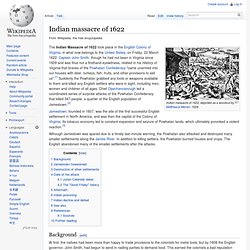
Its tobacco economy led to constant expansion and seizure of Powhatan lands, which ultimately provoked a violent reaction.[3] Background[edit] At first, the natives had been more than happy to trade provisions to the colonists for metal tools, but by 1609 the English governor, John Smith, had begun to send in raiding parties to demand food. This earned the colonists a bad reputation among the Native Americans and precipitated conflict.[4][5] They isolated the Native Americans, burned down houses, and stole their food supplies.[6] The English violence merely served to alienate the natives further; besieged within Jamestown fort for several months and unable to secure more food supplies, many colonists died during the "starving time" in 1609-10.[7] “Your coming is not for trade, but to invade my people and possess my country.”
Cerdic of Wessex. Cerdic was allegedly the first King of Anglo-Saxon Wessex from 519 to 534, cited by the Anglo-Saxon Chronicle as the founder of the Kingdom of Wessex and ancestor of all its subsequent kings.
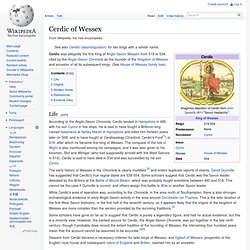
(See House of Wessex family tree). Life[edit] According to the Anglo-Saxon Chronicle, Cerdic landed in Hampshire in 495 with his son Cynric in five ships. He is said to have fought a Brittonic king named Natanleod at Netley Marsh in Hampshire and killed him thirteen years later (in 508) and to have fought at Cerdicesleag (Charford, Cerdic's Ford[1]) in 519, after which he became first king of Wessex.
The conquest of the Isle of Wight is also mentioned among his campaigns, and it was later given to his kinsmen, Stuf and Wihtgar (who had supposedly arrived with the West Saxons in 514). The early history of Wessex in the Chronicle is clearly muddled [2] and enters duplicate reports of events. Origins[edit] J.N.L. Summing up, Myres believed that, Modern times[edit] Alfred the Great. Alfred the Great (849 – 26 October 899) (Old English: Ælfrēd, Ælfrǣd, "elf counsel") was King of Wessex from 871 to 899.
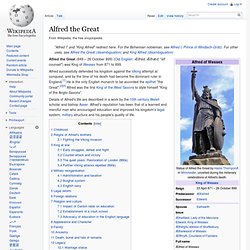
Alfred successfully defended his kingdom against the Viking attempt at conquest, and by the time of his death had become the dominant ruler in England.[1] He is the only English monarch to be accorded the epithet "the Great".[2][3] Alfred was the first King of the West Saxons to style himself "King of the Anglo-Saxons". Details of Alfred's life are described in a work by the 10th century Welsh scholar and bishop Asser. Alfred's reputation has been that of a learned and merciful man who encouraged education and improved his kingdom's legal system, military structure and his people's quality of life. Childhood[edit] Alfred was born in the village of Wanating, now Wantage, Oxfordshire.
In 853, at the age of four, Alfred is said to have been sent to Rome where, according to the Anglo-Saxon Chronicle,[5] he was confirmed by Pope Leo IV who "anointed him as king". Sihtric Cáech (Norse) Sitric Cáech or Sihtric Cáoch (Old Norse: Sigtryggr; Old Irish: cáoch or cáech means "one-eyed") was a Norse King of Dublin who later reigned as King of York.
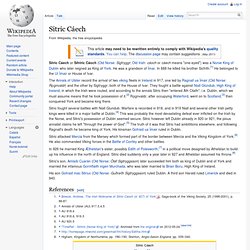
He was a grandson of Ímar. In 888 he killed his brother Sicfrith.[1] He belonged to the Uí Ímair or House of Ivar. The Annals of Ulster record the arrival of two viking fleets in Ireland in 917, one led by Ragnall ua Ímair (Old Norse: Rǫgnvaldr) and the other by Sigtryggr, both of the House of Ivar. They fought a battle against Niall Glúndub, High King of Ireland, in which the Irish were routed, and according to the annals Sitric then "entered Áth Cliath", i.e. Dublin, which we must assume means that he took possession of it.[2] Rǫgnvaldr, after occupying Waterford, went on to Scotland,[3] then conquered York and became king there. Sitric fought several battles with Niall Glundub. His son Gofraid mac Sitriuc (Old Norse: Guðrøðr Sigtryggsson) ruled Dublin. Gruffydd ap Cynan. Gruffudd ap Cynan (c. 1055 – 1137) was King of Gwynedd from 1081, until his death in 1137.
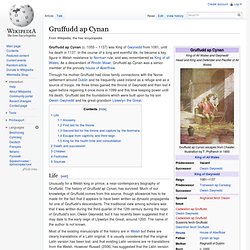
In the course of a long and eventful life, he became a key figure in Welsh resistance to Norman rule, and was remembered as King of all Wales. As a descendant of Rhodri Mawr, Gruffudd ap Cynan was a senior member of the princely house of Aberffraw. Through his mother Gruffudd had close family connections with the Norse settlement around Dublin and he frequently used Ireland as a refuge and as a source of troops. He three times gained the throne of Gwynedd and then lost it again before regaining it once more in 1099 and this time keeping power until his death. Gruffudd laid the foundations which were built upon by his son Owain Gwynedd and his great-grandson Llywelyn the Great.